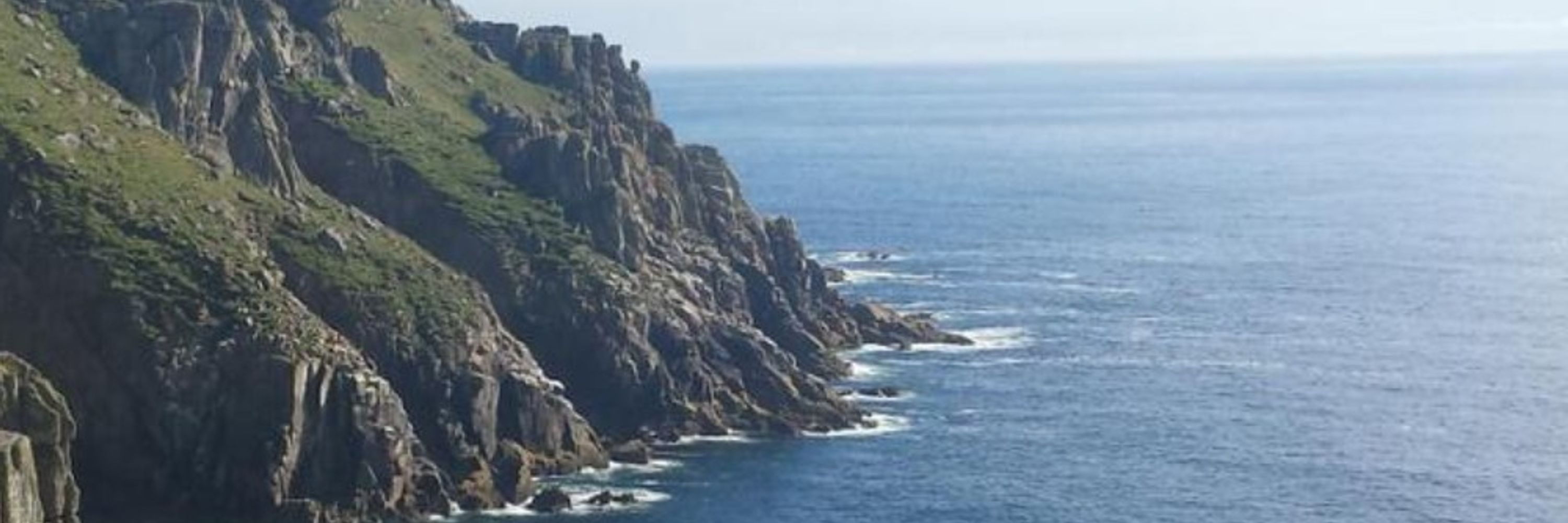
Thilo Gross
@thilogross.bsky.social
Simplifier of things. bridgewalker. Island-person. Nets and Complexity. Prof of Biodiversity Theory. Former Prof. of Computer Science, Reader in Eng. Maths. Once a Physicist. Interested in art and language and generally making the world a better place.
Why is this interesting: First, it shows why diversity tends to collapse in small samples. By missing some of the producers of metabolites we can cross the tipping point. In the equations we can model this effect of sampling as an attack on the network: We replace M(x)->M(A(x)).
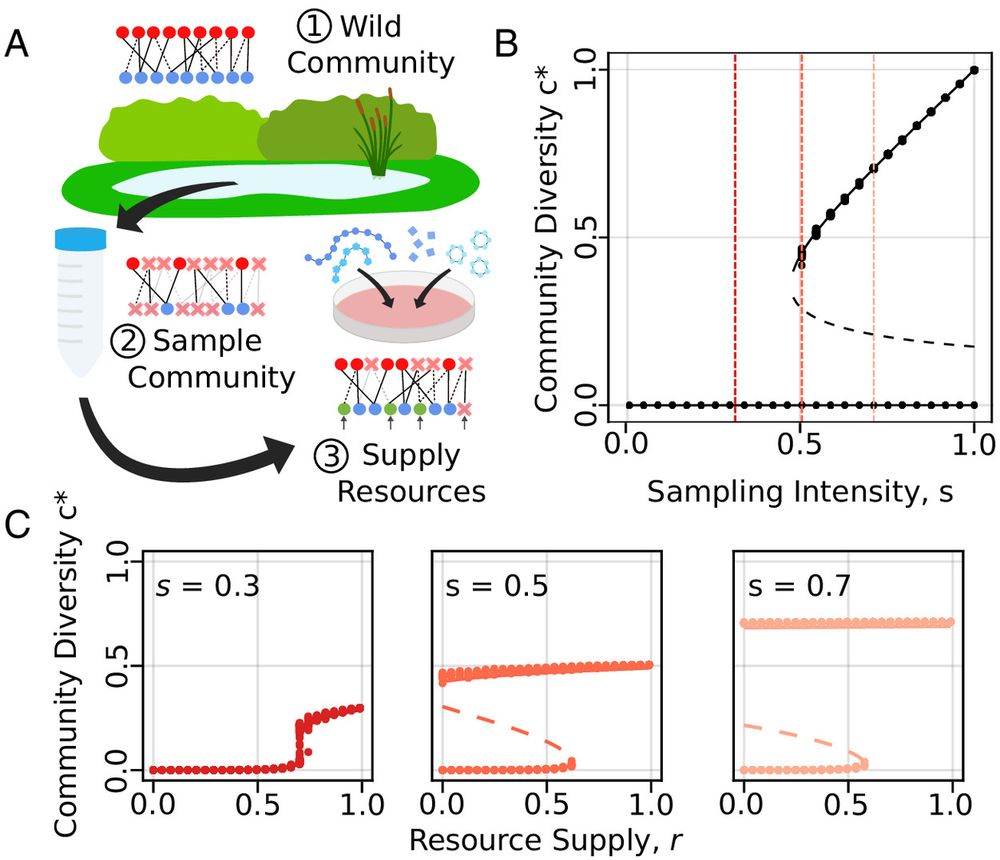
May 7, 2025 at 8:38 AM
Why is this interesting: First, it shows why diversity tends to collapse in small samples. By missing some of the producers of metabolites we can cross the tipping point. In the equations we can model this effect of sampling as an attack on the network: We replace M(x)->M(A(x)).
Of course this is the classic two-folds scenario of tipping, so when we vary a second parameter (e.g. mean number of producers per metabolite), we find a nice Cusp bifurcation. This shows that the transition from high diversity to low diversity can occur by tipping/gradually depending on params...
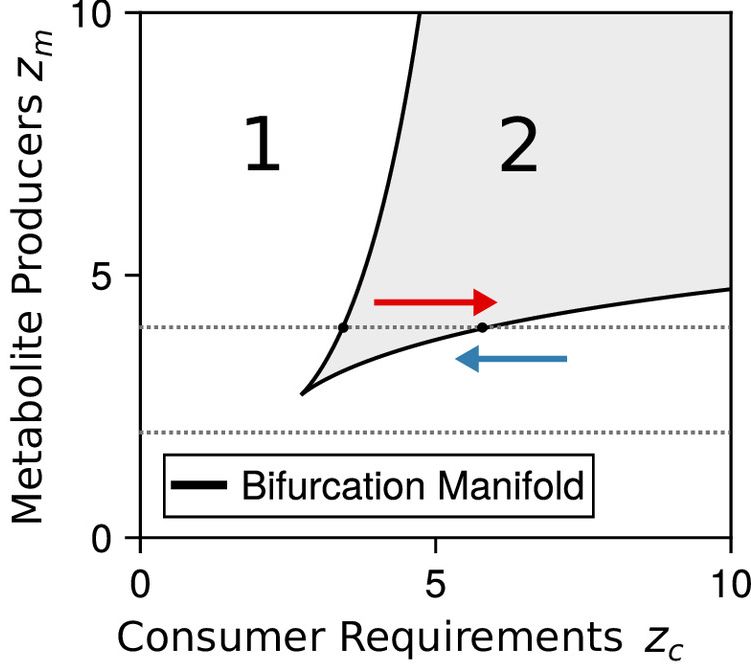
May 7, 2025 at 8:38 AM
Of course this is the classic two-folds scenario of tipping, so when we vary a second parameter (e.g. mean number of producers per metabolite), we find a nice Cusp bifurcation. This shows that the transition from high diversity to low diversity can occur by tipping/gradually depending on params...
For reasonable choices of parameters this system exhibits tipping points between a low and high diversity state ...
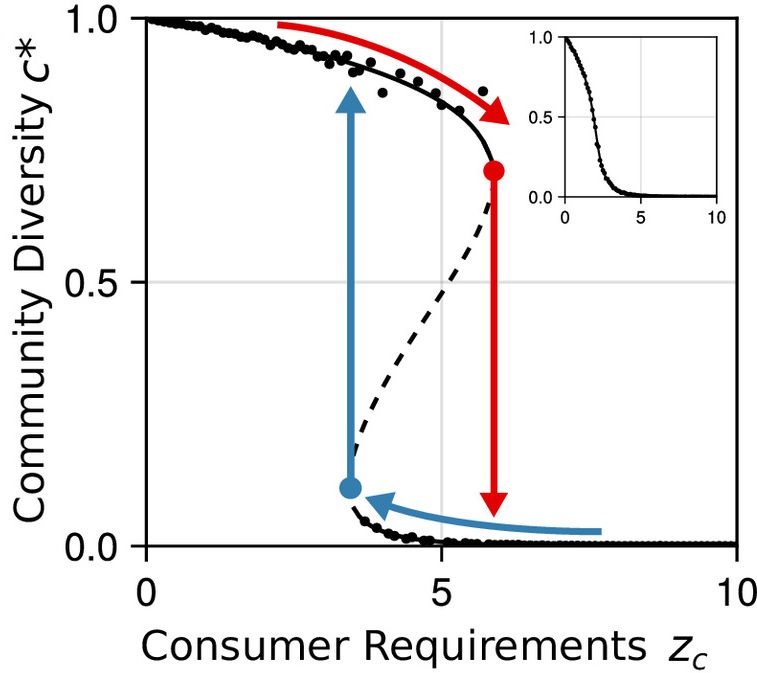
May 7, 2025 at 8:38 AM
For reasonable choices of parameters this system exhibits tipping points between a low and high diversity state ...
So this becomes a percolation problem. The whole setup is captured by two nice eqs. Here c* is num of bacteria chance m^* is num of metabolites, and C, M, are the GFs for number of requirements, number of producers per metabolite ...
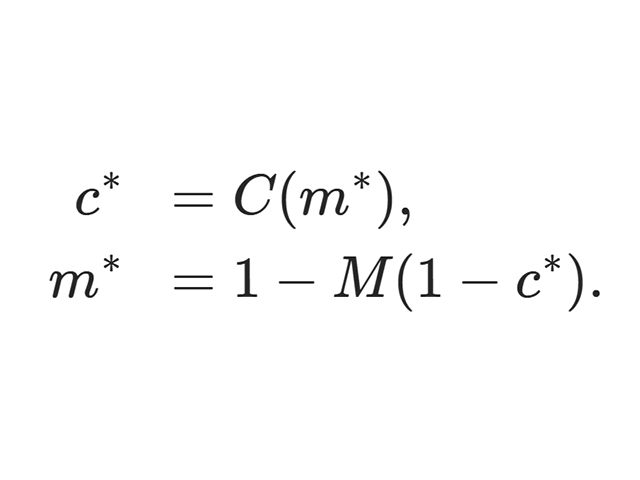
May 7, 2025 at 8:38 AM
So this becomes a percolation problem. The whole setup is captured by two nice eqs. Here c* is num of bacteria chance m^* is num of metabolites, and C, M, are the GFs for number of requirements, number of producers per metabolite ...
So where are the six trillion? They are burning up. Trump's 'reshoring' destroys the highly specialized international supply chains that make things cheap, so everything becomes more expensive, and conversely we have effectively less money. So there it goes.
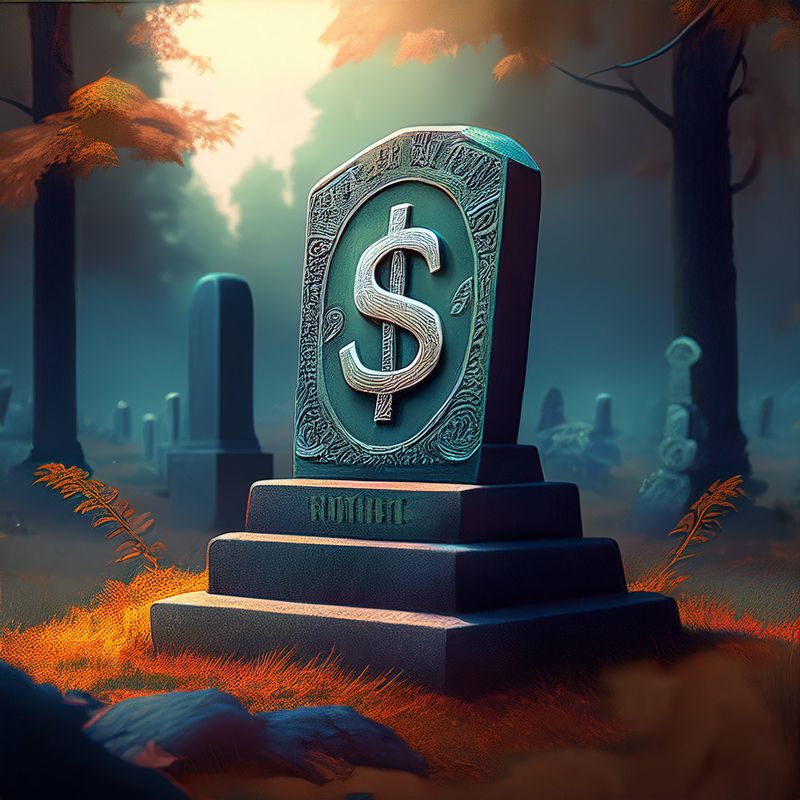
April 6, 2025 at 9:02 AM
So where are the six trillion? They are burning up. Trump's 'reshoring' destroys the highly specialized international supply chains that make things cheap, so everything becomes more expensive, and conversely we have effectively less money. So there it goes.
These complex supply networks cannot exist in any single countries, there can simply not enough businesses to produce everything with a high degree of specialization in one place. This is what drove globalization. (It is also the reason why Brexit never had a chance of working).

April 6, 2025 at 9:02 AM
These complex supply networks cannot exist in any single countries, there can simply not enough businesses to produce everything with a high degree of specialization in one place. This is what drove globalization. (It is also the reason why Brexit never had a chance of working).
The answer is massive division of labor between highly specialized manufacturers. This creates huge 'ecomony-of-scale' savings. Therefore even simple things are nowadays produced by complex supply networks. This reduces competition but also greatly brings down production costs.
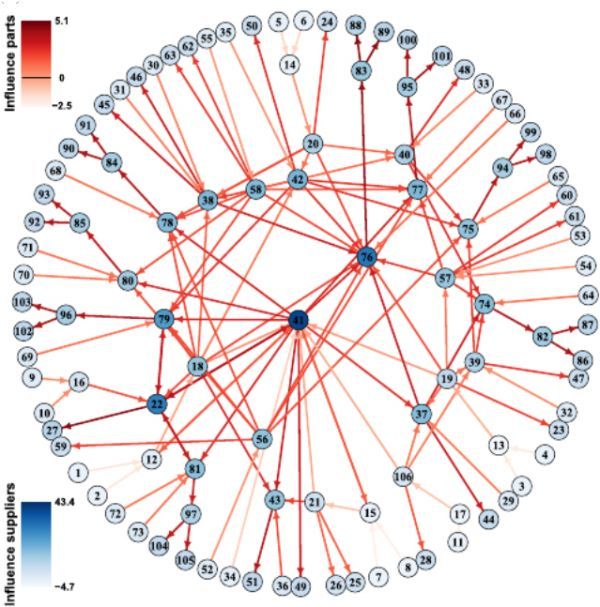
April 6, 2025 at 9:02 AM
The answer is massive division of labor between highly specialized manufacturers. This creates huge 'ecomony-of-scale' savings. Therefore even simple things are nowadays produced by complex supply networks. This reduces competition but also greatly brings down production costs.
First, consider washing machines. I only need to work ca. 15h to earn enough to buy a half-decent one. That's a bargain; I certainly couldn't build one in this time, not from raw materials in any case. But apparently someone can build one for much less than the value of 15h of my time. How?

April 6, 2025 at 9:02 AM
First, consider washing machines. I only need to work ca. 15h to earn enough to buy a half-decent one. That's a bargain; I certainly couldn't build one in this time, not from raw materials in any case. But apparently someone can build one for much less than the value of 15h of my time. How?
Here is a lesser know background regarding the Trump Tarifs. You might have heard that so far they wiped out 6 trillion dollars (!!). But is this money really gone or is it just elsewhere? Most of it is currently being burned, and it is importnat to understand why ... [a short tread]

April 6, 2025 at 9:02 AM
Here is a lesser know background regarding the Trump Tarifs. You might have heard that so far they wiped out 6 trillion dollars (!!). But is this money really gone or is it just elsewhere? Most of it is currently being burned, and it is importnat to understand why ... [a short tread]
Two things I like about my commute in Oldenburg: Cormorands and fog. (also mirror images of C)

March 18, 2025 at 5:46 PM
Two things I like about my commute in Oldenburg: Cormorands and fog. (also mirror images of C)
Poster time at German Physical Society Spring Meeting.

March 17, 2025 at 4:01 PM
Poster time at German Physical Society Spring Meeting.
Really excited about this:

February 21, 2025 at 8:03 AM
Really excited about this:
Question of the month: You have an Erdős-Rényi random graph with a mean degree of 4. Of course it has also a mean excess degree of 4, but then you decide to remove all nodes of degree 0 and 1. Do you expect the mean excess degree to go up or down? (Solution in the NetSci newsletter)

January 11, 2025 at 11:49 AM
Question of the month: You have an Erdős-Rényi random graph with a mean degree of 4. Of course it has also a mean excess degree of 4, but then you decide to remove all nodes of degree 0 and 1. Do you expect the mean excess degree to go up or down? (Solution in the NetSci newsletter)
CALL FOR ARTISTS: We are looking for 7 audio visual artists to be paired with 7 Marine scientists for an exciting new ocean art science project. More details here: t.co/ljI81FbXc9
#EduSky #ArtSky #Art
#EduSky #ArtSky #Art

July 1, 2024 at 11:11 AM
CALL FOR ARTISTS: We are looking for 7 audio visual artists to be paired with 7 Marine scientists for an exciting new ocean art science project. More details here: t.co/ljI81FbXc9
#EduSky #ArtSky #Art
#EduSky #ArtSky #Art
If you see this, post a bridge

May 20, 2024 at 1:23 PM
If you see this, post a bridge
Eventually Jeffrey Lucas wrote a book about the walk, the bridges, and their history. In the meantime additional bridges had been built and this turned the the route into a cycle.

April 10, 2024 at 9:57 AM
Eventually Jeffrey Lucas wrote a book about the walk, the bridges, and their history. In the meantime additional bridges had been built and this turned the the route into a cycle.
In contrast to other things I had done before the interest in this never subsided. The walk is about 56km long and people were doing it as a challenge; it was incorporated into many fund raising events, which generated more coverage.

April 10, 2024 at 9:55 AM
In contrast to other things I had done before the interest in this never subsided. The walk is about 56km long and people were doing it as a challenge; it was incorporated into many fund raising events, which generated more coverage.
After much research on google maps one failed attempts I found a route that worked and eventually went on my walk that crossed each bridge exactly once. Word about this got out and there was an immediate response from the Media. People were genuinely interested in the walk and the maths!

April 10, 2024 at 9:50 AM
After much research on google maps one failed attempts I found a route that worked and eventually went on my walk that crossed each bridge exactly once. Word about this got out and there was an immediate response from the Media. People were genuinely interested in the walk and the maths!
I was teaching this in Bristol, when I realized that Bristol has many similarities with K. Among others it also has two islands in a river. And 'Bristol' literally means 'Place of the Bridge', so I had to check whether the walk was possible

April 10, 2024 at 9:44 AM
I was teaching this in Bristol, when I realized that Bristol has many similarities with K. Among others it also has two islands in a river. And 'Bristol' literally means 'Place of the Bridge', so I had to check whether the walk was possible
But Euler's proof of the impossibility of the walk was felt to be so beautiful that it inspired many subsequent work that became graph theory, the mathematical study of networks.

April 10, 2024 at 9:39 AM
But Euler's proof of the impossibility of the walk was felt to be so beautiful that it inspired many subsequent work that became graph theory, the mathematical study of networks.
In fact the K.-graph is simplest network where there is no solution without that being immediately obvious. And this is no coincidence: This was never a serious problem, just 18th century people trolling each other with an unsolvable puzzle.

April 10, 2024 at 9:36 AM
In fact the K.-graph is simplest network where there is no solution without that being immediately obvious. And this is no coincidence: This was never a serious problem, just 18th century people trolling each other with an unsolvable puzzle.
Every node of odd degree has this problem: If there is a node of odd degree it must be start or the end point of our walk, or no walk that crosses every bridge exactly once exists. But in K. there are four nodes of odd degree so no such walk is possible.

April 10, 2024 at 9:32 AM
Every node of odd degree has this problem: If there is a node of odd degree it must be start or the end point of our walk, or no walk that crosses every bridge exactly once exists. But in K. there are four nodes of odd degree so no such walk is possible.
So how about a node of degree 3? Obviously we need to visit it twice. On our first visit we use one bridge to arrive and one to depart. After this first visit the node has effectively become a node of degree 1, so the second visit we trap ourselves there.

April 10, 2024 at 9:28 AM
So how about a node of degree 3? Obviously we need to visit it twice. On our first visit we use one bridge to arrive and one to depart. After this first visit the node has effectively become a node of degree 1, so the second visit we trap ourselves there.
By contrast nodes of degree 2 are much more well behaved, we can arrive on one bridge and depart via the other. So unless we start our walk in a node of degree 2, we can't trap ourselves there.

April 10, 2024 at 9:25 AM
By contrast nodes of degree 2 are much more well behaved, we can arrive on one bridge and depart via the other. So unless we start our walk in a node of degree 2, we can't trap ourselves there.
If there was a node of degree 1 in our network we would clearly have a problem. Such a node could only ever be the start or the end point of a walk that crosses every bridge exactly once (if there is such a walk)

April 10, 2024 at 9:24 AM
If there was a node of degree 1 in our network we would clearly have a problem. Such a node could only ever be the start or the end point of a walk that crosses every bridge exactly once (if there is such a walk)

